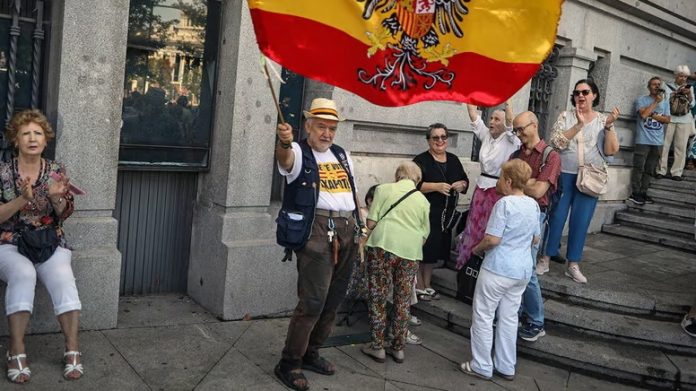Acting Prime Minister Pedro Sánchez may be sworn in for a second term earlier than expected, Euractiv reports.
His socialist PSOE party has struck a deal with Catalonia’s Republican Left to fulfil parliament’s latest demand for an amnesty law for those involved in the 2017 secession attempt.
The party, which backed Sanchez in the last election, finally gave in, despite the fact that there was still no official “yes” from the Catalan Republican Left (ERC) after a meeting on Monday between the third PSOE leader Santos Cerdán and separatist leader Carles Puigdemont (JxCat).
State broadcaster RTVE reported on Wednesday that the first vote on Sanchez’s appointment, which the PSOE wants by a simple majority, could take place as early as 8 or 9 November, with the controversial amnesty law to be registered in parliament on Thursday.
Sanchez is demanding that the PSOE speed up negotiations in order to attend the Party of European Socialists (PES) congress in Malaga on 10-11 November as Spain’s new prime minister. However, the crucial deal has already been criticised by Miguel Tellado, deputy secretary of the main opposition party in parliament, the Popular Party (PP/EPP). Tellado believes the agreement is “the biggest attack on the rule of law in our democratic history,” El País reported.
JxCat and the ERC had originally put forward an amnesty law and a referendum on Catalan self-determination as two necessary conditions for supporting Sánchez’s next government, but while the latter was ruled out as unconstitutional, the former was already in the PSOE’s political pocket after the extraordinary general election on 23 July.
For the moment, the president of the Catalan regional government (Generalitat), Pere Aragonés (ERC), and Puigdemont seem satisfied that Sánchez has accepted the first of their demands.
After a symbolic “Brussels photo” on Monday Sanchez and Aragonés reached an agreement on the content of the amnesty law and delegated their negotiating teams to finalise the details, closing a complex circle of political concessions to pro-independence forces.
However, the JXCat, whose seven seats are crucial for the Socialist candidate to return to power, must approve this text. The two leaders also reached an agreement in which there are “political and economic” topics that will be discussed and developed in the next legislature, including the transfer of more powers from Madrid to Catalonia, sources in the PSOE and ERC told EFE news agency on Wednesday.
A key point of the agreement is that the separatist party has succeeded in getting a future amnesty law to cover those under investigation in cases related to the former pro-independence Democratic Tsunami platform and the Republic Defence Committees, ERC sources told EFE. The future amnesty law should indeed “include all political repression”, according to Patricia Plaja, a spokesperson for the Catalan regional government.
The organisation Tsunami Democrático was created in 2019 by several leading figures from Catalan civil society and political parties to oppose court rulings outlawing events that advocated for the region’s independence between 2012 and 2021.
Committees for the Defence of the Republic were set up in 2017 to organise an independence referendum shortly after the Constitutional Court declared the referendum held in Catalonia on 1 October that year illegal. ERC sources told EFE news agency that the text of the future amnesty law will not make any reference to the allegedly criminal nature of the 1 October 2017 referendum, which is a demand of JxCat.
Sanchez’s agreements with JxCat, ERC, Sumar, the Basque Nationalist Party (PNV), Basque separatist movement EH Bildu and other regional formations give him the green light to be elected for another four-year term.
However, Sanchez could face stiff opposition from PP and VOX, the former of which is the main opposition group with a majority in the Senate and the latter the third largest force in parliament. Both parties have already announced that they will call for new demonstrations, following the one that VOX held to protest against the amnesty law in Madrid last Saturday. Several civil society organisations have scheduled a demonstration against the emergency mercy measure for November 18.
Meanwhile, PP leader Alberto Núñez Feijoo has reiterated that he will file a lawsuit with the Constitutional Court to try to stop Sánchez’s “capitulation” to Catalonia’s separatists.
